- Home
- Douglas Niles
Measure and the Truth tros-3
Measure and the Truth tros-3 Read online
Measure and the Truth
( The Rise of Solamnia - 3 )
Douglas Niles
Douglas Niles
Measure and the Truth
PROLOGUE
THE RISE OF SOLAMNIA
The very name bespeaks history, legend, and ancient glory: Solamnia.
It hearkens back to the Age of Dreams and a time that ushered in the Age of Light. It is a place named for a man of legend who was a general, a rebel, an emperor who became greater than any king.
Vinas Solamnus was that rarest of heroes, a master leader of men who recognized the wrongness of his own cause, and who changed from an agent of imperial power to a champion of right and virtue. In the changing, he formed his own nation, at first a branch of the mighty Empire of Ergoth, but eventually an empire in its own right.
Solamnus founded the order of knights who still bear his name and who served the creed he laid down for them, prescribed in the Oath and the Measure. Est Sularus oth Mithas — my honor is my life. Such was the founder, and such is the nature of any man who swears fealty to the Knights of Solamnia.
As the Age of Light became the Age of Might, the Knights of Solamnia became the best hope of the world, and waged a great struggle. Their triumph assured the survival of freedom, goodness, and mortal choice on the face of Krynn. A magnificent hero, Huma, proved the eternal truth and power bound up in the Oath and the Measure.
But in the wake of that war, beginning more than a dozen centuries before the start of our own story, that empire and that credo began to fracture. Facing forces of modernity and opposition on every side, the Solamnic Knighthood was driven into the shadows, blamed-wrongly! — for much of the wickedness in the world. The knights became outlaws, their cities and nations reduced to minor fiefdoms, the domains of warlords and petty dukes and merchants.
Through the Cataclysm and the long centuries of the subsequent Age of Darkness, the nation remained torn, its knighthood in disgrace and disarray. Again falsely accused, the Knights of Solamnia were driven into hiding, even hunted and killed. It was not until the return of the dragons, and the War of the Lance, that Solamnia’s long night began to brighten into day. Another hero for the ages, this time the knight Sturm Brightblade, led the order toward the birth of a new era.
But it was a violent and grisly birthing. The crown jewel of Solamnia, the city of Palanthas, was subjected to special scourging, as the Dragon Highlord Kitiara led a brutal attack resulting in terrible damage. Magical storms wracked the city, and a convulsive spell caused the Tower of High Sorcery-a landmark of Palanthas from before the city even existed-to vanish from the known world.
When the Dragon Overlord Khellendros laid claim to northern Ansalon, an area that included Palanthas, the city’s doom might have seemed all but assured. Yet somehow the citizens not only survived, but managed to prosper, through the trade that had always been Solamnia’s lifeblood. Khellendros was eventually slain, and the Dark Knights ruled the land for a time, but soon after the War of Souls ended, the Knights of Solamnia struck in concert, reclaiming the heartland of their ancient regime by 40 SC.
Even then the lands of the historic nation lacked a soul, a binding force. Under the ostensible mastery of Lord Regent Bakkard du Chagne, appointed by the High Council as the Solamnic master of Palanthas, the old cities were divided among noble knights deemed worthy of holding power. Caergoth, Solanthus, Thelgaard, Vingaard, and Garnet were all ruled as independent city-states. They were in no sense a united nation.
Du Chagne was a merchant prince, who displayed the fabulous wealth of his treasury in pure yellow ingots enchanted to glow magically from the windowed room at the top of a tower he called the Golden Spire. Content to amass wealth in Palanthas, he let alone the cities on the plains, and the ruling dukes did as they pleased…
Until a new threat to the peace on those plains appeared in the form of a half-giant barbarian named Ankhar, who called himself The Truth. Ankhar was the tool of an evil god, Hiddukel, the Prince of Lies, but he did not see that he was not his own master. Born in the Garnet Mountains, Ankhar gathered a horde of goblins, ogres, draconians, and the like, and in 42 SC he emerged from his lofty heights to lay waste to the plains in a war that raged for nearly three years. Garnet and Thelgaard were sacked, and Solanthus was subjected to a siege of more than a year’s duration.
Then at last a leader who would reforge the ancient realm emerged. Jaymes Markham was not a man of noble ancestry; he bore no claim to the blood of kings or dukes. Yet he was a true leader of men and a general of surpassing skill. He was aided by the discovery of an explosive compound, a black powder he used with considerable effectiveness on the battlefields of Solamnia. He was aided, too, by a young mistress of magic, a prodigy of a wizard who embraced the cause of Solamnia and fought steadfastly at his side. Coryn the White was her name.
They became lovers, and they might have even been in love, once. But the man who would rule a nation discovered a higher calling. Jaymes Markham married Selinda du Chagne, the Princess of Palanthas and daughter of the Lord Mayor. Through her, he claimed rule-and gained access to her father’s nearly unlimited funds. There seemed to be none to challenge him.
As the lord marshal of all the Solamnic armies, Jaymes Markham waged war against the invader, and proved that The Truth was, in fact, a hollow lie. Slowly, at great cost in blood and treasure, the humans and their allies drove Ankhar’s barbarians back to the hinterlands. The three orders of the knights-the Rose, the Crown, and the Sword-served one master at last and finally defeated the invading horde in the Battle of the Foothills, a memorable day-long clash on the northeastern fringe of the Garnet Range.
With this costly victory, the last vestiges of ducal power were broken. The knights on the battlefield acclaimed their Lord Marshal as greater than any noble in their time. He became the master of all the elder nations of Solamnia-those that still flourished after the cataclysms-and he wove those lands into an empire, with himself firmly seated upon the emperor’s throne.
CHAPTER ONE
THE EMPEROR RIDES
It was important to be seen.
Jaymes understood this principle of command from his days as a sergeant of the line. To lead, one had to be observed in action, accepting the same risks as the men under his leadership. Once, he had practiced this principle as a captain of the Rose Knights, back when serving as Lord Lorimar’s aide de camp. As Lord Marshal, he had made certain all the men in his four armies knew his face.
As the emperor, he would see to it that the people of his empire knew him as well.
So it was that, even as his army gathered outside the gates of Palanthas, planning and preparing for a new campaign, he took the time to ride through the streets of the great city. He had a personal guard of one hundred men, the Freemen, who would all have been honored to accompany him, but he did not require such a display just then. Instead, he would present the face of courage… and calm. With but a single man-at-arms, the loyal and capable Sergeant Ian, riding at his side, the emperor, astride his white stallion, slowly promenaded through the streets of Palanthas. It was not a horse he would ride on campaign, but it was splendid for show. He made his way from his palace, a new structure that loomed over the city’s great central plaza, through the bustling mercantile districts, past the villas of nobles and merchants.
He rode through the New City, the teeming buildings outside the great wall-though he pointedly disdained the neighborhood dominated by the lord regent’s palace and its great tower, the Golden Spire. Passing through the gates, back into the realm of taverns and guildhouses along the waterfront, the emperor accepted cheers from veteran soldiers, spoke kindly to women and children, complimented laborers and nobles alike on t
heir work, their accomplishments, even their manners and dress.
At the intersections of the city’s great avenues, he found crowds of people gathered, for the heralds had gone out before him and were busy making it known to all that the emperor had issued a decree. Jaymes did not stop and listen to the heralds-he knew what they were saying-but instead he watched the people, studying their reaction to his words.
“The emperor and his Legion of Palanthas march to bring the insurrection at Vingaard Keep to an end!” the heralds proclaimed, reading from scripted scrolls at twelve different locations in the city. They repeated the message every hour of the day, so every citizen who was interested had a chance to be informed.
“Those who challenge the lawful authority of the New Council and the Solamnic Senate are nothing more than outlaws, and they shall be dealt with as such! Lord Kerrigan of Vingaard has refused to obey the lawful orders of his liege. The New Army of Solamnia, under the command of Emperor Markham, goes to administer the lesson in a manner that shall make His Excellency’s determination apparent to all!”
Some citizens muttered at the words, while others cheered, but all took note. And if the people who heard the news looked at him askance, Jaymes did not care. What was important was that they looked at him, saw him, knew him-and recognized his authority.
Perhaps he felt an occasional longing for the simpler life of a warrior. He spotted a dwarf at a waterfront inn who reminded him of his old trail mate Dram Feldspar, and the emperor had to suppress a desire to dismount, enter the tavern, and have a drink with the fellow. But that, he could not- would not-do. He was of the people no longer; they must come to see he was above them.
The first years of leadership had taken their toll on him in ways that could be detected even by a casual observer. Though he was not yet forty, his once-black hair was flecked with gray along the sideburns. His neatly trimmed beard was shot through with light hairs, giving the impression that it was crusted with salt. Crinkles of age ran from the corners of his eyes-the proof of too little sleep, of a host of problems that could never be completely solved.
Still, he rode straight and proud in his saddle, his strong features inspiring confidence in the men, his rugged handsomeness bringing flutters to the hearts of the women. His chest encased in black armor, with the mighty sword Giantsmiter hanging at his side, he cut a dramatic figure. Sergeant Ian carried his unique banner, the white field with the combined golden images of Crown and Sword and Rose, and the people understood that he was the Lord of No Sign and of All.
Reaching the waterfront at last, he and Sergeant Ian dismounted. The stevedores and sailors stood back in awe as he made his way to a massive trading vessel, the Star of Mithas, which had arrived in port just the previous day. Her owner and master was a minotaur of that eastern land, a towering bull named Horth Bearslayer. A new policy of the emperor’s had allowed minotaurs access to the Palanthian docks-subject to high tariffs and tight regulation-and the ship’s captain knew a benefactor when he saw one. He made a great show of welcoming the master of Solamnia to his own seafaring domain.
Horth Bearslayer covered his gangplank with red velvet and greeted the emperor with a formal bow-an honorific no minotaur offers casually.
“I am grateful for the chance to trade in these waters, Excellency,” the minotaur said solemnly. “The wisdom of the emperor is shown in the freedom he grants his merchants.”
“The success of the merchant is the pride of an empire,” Jaymes replied. He spent a short time touring the vessel, which was huge and tall, with a hull made from logs as big around as an ogre’s waist, and pronounced himself pleased. When he departed, the minotaur captain was beaming, and the people watching from the docks whispered that even greater prosperity lay in the near future.
On the way back to his palace, the emperor made one more stop: he climbed the steps of the great library on foot and was met at the door by one of the elder Aesthetics, a man named Pastorian.
“How can we serve the master of all Solamnia?” the Aesthetic asked with a low bow.
“I want to know more about the minotaurs,” said Jaymes. “What are their numbers and locations? I desire a complete order of battle of all of their troop formations on Ansalon and estimates as to reserves on their homelands. I want to know who their rulers are, how old they are, who will succeed them.”
“I understand, Excellency,” Pastorian replied with another bow. “I shall set my researchers on the task at once. Naturally, the information will take some time to collect.”
“That’s fine. You have the rest of the summer and the autumn to make your report. I would like to read your findings by the time of Yule-something to while away the winter nights.”
“Of course, Excellency.”
If the Aesthetic blanched a bit at the task and accompanying deadline, he could be forgiven. Given the widespread activities of the minotaurs since the conclusion of the War of Souls, the assignment was indeed daunting. They were known to be at war on the mainland, and they ruled the eastern seas with their mighty ships. The greatest efforts of the Aesthetics staffing the library would of necessity be devoted to the imperial commission. The true calling of the order, which was the recording of the day-by-day history of Krynn, would have to be diverted and delayed.
But Pastorian, too, had seen the emperor in action, and in that, as in all, the emperor would be obeyed.
Jaymes knocked on the entrance to his wife’s suite of rooms, high up in one of the great towers of his palace. She opened the door quickly, saw him, and turned and walked back into the room. He entered, closed the door behind himself, and approached her. When he put a hand on her shoulder, she turned and looked at him.
Her face was expressionless, but he noted suspicion-or was it fear-in her eyes. For a brief moment, he longed for the warmth, the unquestioned love, he had once glimpsed there. That was gone most of the time, and he knew it was folly to try to get it back.
Selinda was gazing out the window. She gestured at the great army column, already outside the city gates, lined up on the road, waiting for its commander.
“So you’re really going?” she asked. “Marching on Vingaard Keep?”
“I have to,” he replied. “Lord Kerrigan leaves me no choice.”
She spun around, glaring at him. “I thought your plan was to unite Solamnia? Forge one nation? Yet now you’re breaking it apart!”
“You don’t understand,” he said calmly, while wishing devoutly that she did. “Unity requires sacrifice, so the parts will make the whole stronger. Kerrigan will not accept that essential truth. His realm was spared the scourge of Ankhar’s war. Now Vingaard needs to make up the difference, give us men for my army, steel for the nation’s treasury. He absolutely has refused to do either.”
“And you are the new ruler of the nation. You’ve been emperor for less than a year, and you can’t let this refusal go unchallenged.”
Her sarcastic tone was lost on him. Instead he nodded, feeling a swelling of relief. Perhaps she did understand! She turned her back and walked to the high windows, the beautiful clear panes of glass that allowed her to look out over her city like a goddess viewing the world from atop a cloud. She had everything she needed in there; he had worked hard to make the rooms suitable for her.
He walked up behind her, leaning forward to inhale the sweet smell of her hair. Long and as bright as spun gold, her hair was a vital part of her beauty. His right hand caressed the curve of her hip, and he felt a swelling of affection and of proprietary pride. “You are still the most beautiful woman in all Solamnia,” he said, “and so precious to me.”
She didn’t turn, didn’t respond with the tender sigh that, a year earlier, would have been followed by a swoon into his arms. When she spoke, her words were controlled and aimed like darts at the window.
“I am a person, like any other. I wonder sometimes that I should be here simply because you find me beautiful.”
“Why should that make you wonder?” His left hand found he
r other hip; he moved close behind her.
“I wonder if it was ever my beauty that attracted you. Or was it the fact my father is lord regent, that he controlled the treasury of Palanthas-and of all Solamnia?”
He shrugged, giving no indication of offense. “It was a useful circumstance, true. But did you not come willingly into my arms? We chose each other, don’t you remember?”
Finally she turned to stare at him with pain in her eyes. “Then why are things so different now? Why do I feel so different?”
Jaymes grunted, dropping his hands. “I don’t know,” he replied. “And I have to be going.” He started toward the door, then stopped and turned back to her. “One more thing. I want you to stay in your chambers until I return,” he said. “There are too many threats abroad for you to venture out safely. You will be safe here and well cared for. Marie has a bed in your anteroom, and I’ve ordered a full platoon of guards to stand by, to make sure that you want for nothing.”
“Want for nothing? I want to walk around the palace-the city!” she retorted angrily, crossing to him. “What kind of threats are out there that can’t be stopped by an escort of your personal guards?”
He placed his hands on her shoulders and looked into her eyes, his expression maddeningly serene. “I don’t want any chance of exposing you to violence-or the gods know what else. Illness, pestilence-they’re all about the city these summer months.” With a meaningful look downward, he placed a hand on her stomach. His touch made her flinch, but he didn’t seem to notice her reaction.
“Remember, it’s not just your own health at stake,” he cautioned.
With that, he gave her a perfunctory kiss, turned, and marched out the door. The sergeant of the guard did not even glance at her as he closed the door behind Jaymes Markham, Emperor of the Solamnic Nation.

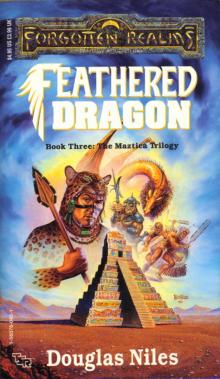 Feathered Dragon mt-3
Feathered Dragon mt-3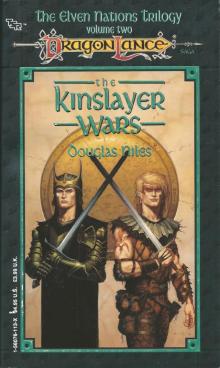 The Kinslayer Wars
The Kinslayer Wars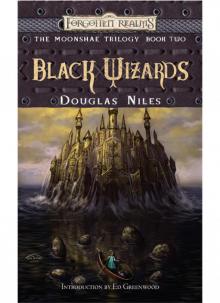 Black Wizards
Black Wizards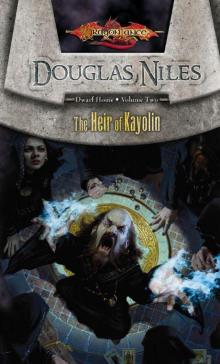 The Heir of Kayolin dh-2
The Heir of Kayolin dh-2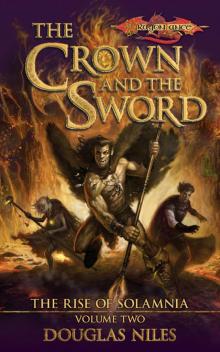 The Crown and the Sword tros-2
The Crown and the Sword tros-2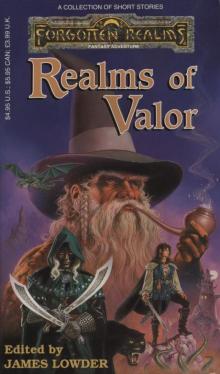 Realms of Valor a-1
Realms of Valor a-1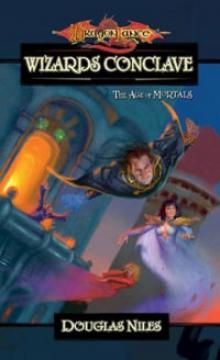 Wizards Conclave aom-5
Wizards Conclave aom-5 Fox On The Rhine
Fox On The Rhine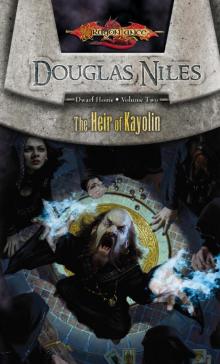 The Heir of Kayolin
The Heir of Kayolin Fox at the Front (Fox on the Rhine)
Fox at the Front (Fox on the Rhine)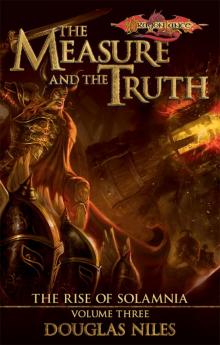 Measure and the Truth tros-3
Measure and the Truth tros-3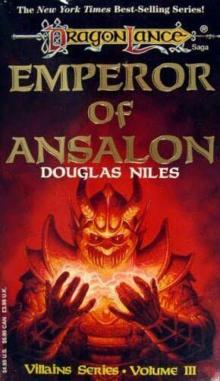 Emperor of Ansalon (d-3)
Emperor of Ansalon (d-3)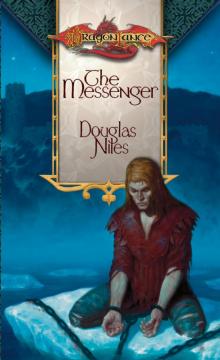 The Messenger it-1
The Messenger it-1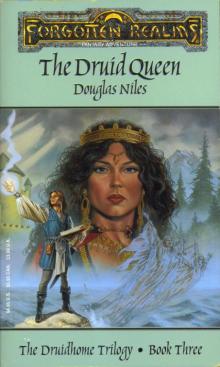 The Druid Queen tdt-3
The Druid Queen tdt-3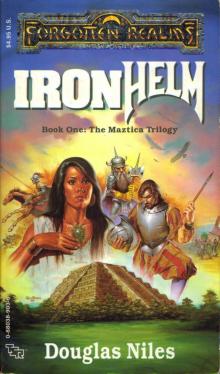 Ironhelm mt-1
Ironhelm mt-1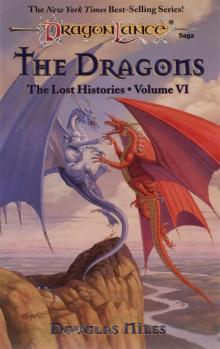 The Dragons lh-6
The Dragons lh-6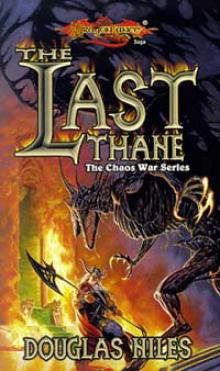 The Last Thane cw-1
The Last Thane cw-1 Circle at center sc-1
Circle at center sc-1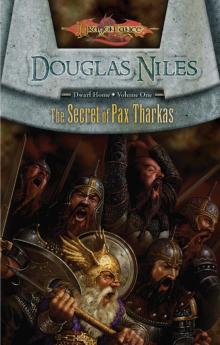 Secret of Pax Tharkas dh-1
Secret of Pax Tharkas dh-1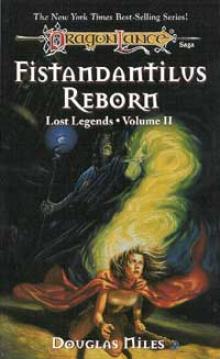 Fistanadantilus Reborn ll-2
Fistanadantilus Reborn ll-2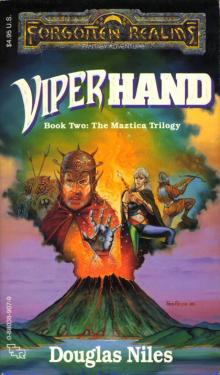 Viperhand mt-2
Viperhand mt-2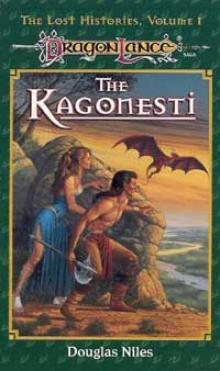 Kagonesti lh-1
Kagonesti lh-1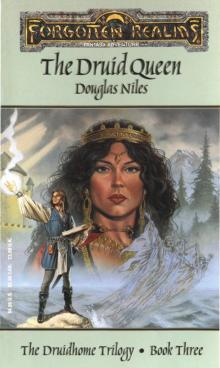 The Druid Queen
The Druid Queen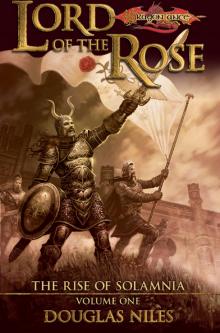 Lord of the Rose tros-1
Lord of the Rose tros-1 Goddess Worldweaver sc-3
Goddess Worldweaver sc-3 Eyeball to Eyeball (Final Failure)
Eyeball to Eyeball (Final Failure)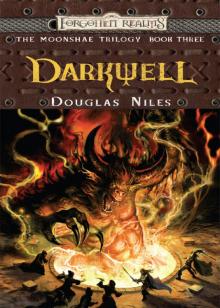 Darkwell
Darkwell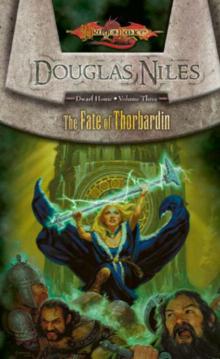 Fate of Thorbardin dh-3
Fate of Thorbardin dh-3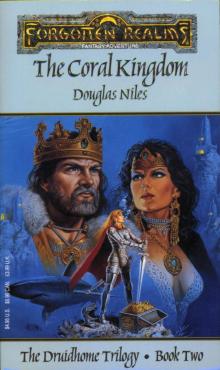 The Coral Kingdom tdt-2
The Coral Kingdom tdt-2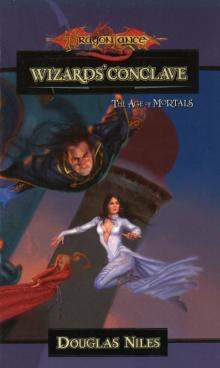 Wizard's Conclave
Wizard's Conclave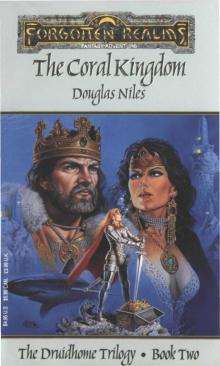 The Coral Kingdom
The Coral Kingdom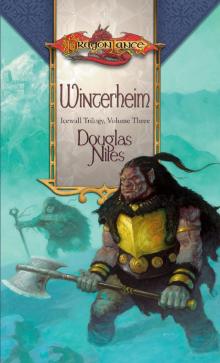 Winterheim it-3
Winterheim it-3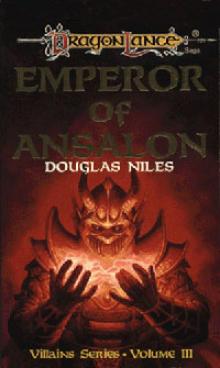 Emperor of Ansalon v-3
Emperor of Ansalon v-3 MacArthur's War: A Novel of the Invasion of Japan
MacArthur's War: A Novel of the Invasion of Japan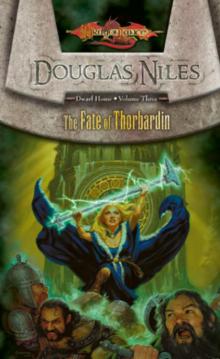 The Fate of Thorbardin
The Fate of Thorbardin The Rod of Seven Parts
The Rod of Seven Parts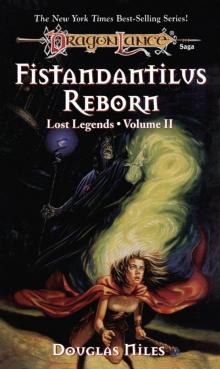 Fistandantilus Reborn
Fistandantilus Reborn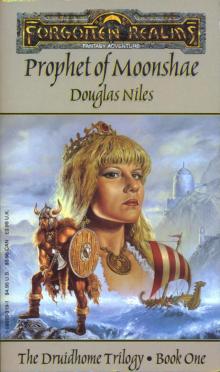 Prophet of Moonshae tdt-1
Prophet of Moonshae tdt-1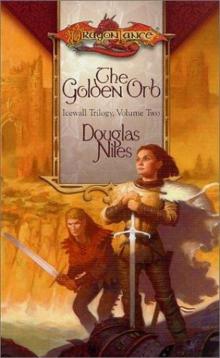 The Golden Orb i-2
The Golden Orb i-2